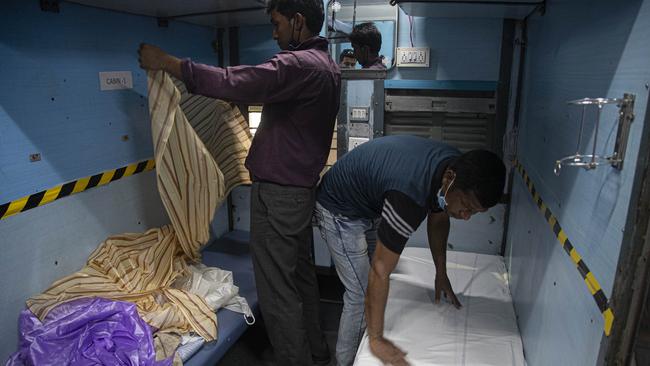Coronavirus: India unveils unique mobile isolation wards
India has converted 2500 rail coaches to isolation wards to create an extra 20,000 isolation beds for COVID-19 patients.

For 167 years, Indian Railways has been the arteries of the country. Now it could also be the lungs.
The national railways, which suspended all passenger trains on March 25 to comply with Prime Minister Narendra Modi’s three-week lockdown, said this week it had converted 2500 rail coaches to isolation wards to create an extra 20,000 isolation beds for confirmed and suspected COVID-19 patients.
More will be converted in coming weeks and sent to locations with hospital bed shortages.
Pictures released by the country’s largest employer show coaches with plastic curtains across the doors, windows sealed with gaffer tape and cabins decked out with basic medical equipment.
It has also developed a cheap ventilator — at an estimated cost of just 10,000 rupees ($215) — to augment the estimated 30,000 to 50,000 ventilators available in a country of almost 1.4 billion people.
“It’s a good initiative … but only a short-term solution,” says virologist Shahid Jameel, who also heads Indian charity Wellcome Trust that funds medical research.
“When this is over, let this be a wake-up call to invest more towards improving health infrastructure and research.”
India confirmed its first COVID-19 case on January 30, and the country’s caseload has since grown to 4778 patients and 136 deaths. But a Brookings India study has estimated it could need up to 220,000 ventilators by May 15 in a worst-case scenario in which 2.2 million people were infected and up to 10 per cent required critical care. The country has only between 70,000 and 100,000 intensive care unit beds.
Even more dire modelling by the Centre for Disease Dynamics, Economics and Policy has warned that India’s likely COVID-19 peak could mean 100 million people infected, and as many as four million requiring hospitalisation.
While social distancing could, in theory, reduce that peak load by as much as 75 per cent, the study concluded it would be “difficult to enforce in India”, a country with some of the world’s highest population densities.
“Hospital outbreaks of COVID-19 induced by the admission of infected patients into hospitals could also be a major issue. There is a need for large, temporary hospitals to handle this patient load over the next three-month period,” it said.
Reflecting global concern over the potential scale of the outbreak in India, the World Bank has fast-tracked a $US1bn ($1.65bn) loan to help it build a more robust public health response but also address the “deep social and economic implications” of the pandemic.
India is more than halfway through a total lockdown that has left millions without jobs, forced migrant workers to flee cities in search of food and shelter and interrupted critical food supply chains.
While the lockdown is helping prevent the spread of the virus, it is devastating the economy and the government is under pressure not to extend it beyond next Tuesday.
Ratings agency Fitch last week slashed India’s 2020-21 growth forecast to a 30-year low of 2 per cent, from 5.1 per cent. India’s GDP needs to grow at more than 7 per cent to pull millions out of poverty.
The World Bank has also warned that Southeast Asia’s largest economies — The Philippines, Indonesia, Malaysia and Thailand — face a COVID-19 – fuelled recession that could drive up to 11 million people back into poverty.
Those fears have led the Indonesian government to resist calls to lock down Jakarta and ban the annual Idul Fitri homecoming next month.
India’s cabinet is considering a staged reopening that keeps hotspot districts, including Kerala and parts of Delhi, closed while getting other parts of the country back to work.
Brookings India senior fellow Constantino Xavier says for many Indians the devastating impact of an economic crisis is at least as worrying as a new virus in a nation where millions live hand to mouth and thousands die from TB every year. “(COVID-19) does not have the political salience it does in developed societies where people have greater expectations about health,” he told The Australian. “It’s a trade-off for every country; the economic costs versus public health … for India, the incentives are more on the economic side.”




To join the conversation, please log in. Don't have an account? Register
Join the conversation, you are commenting as Logout